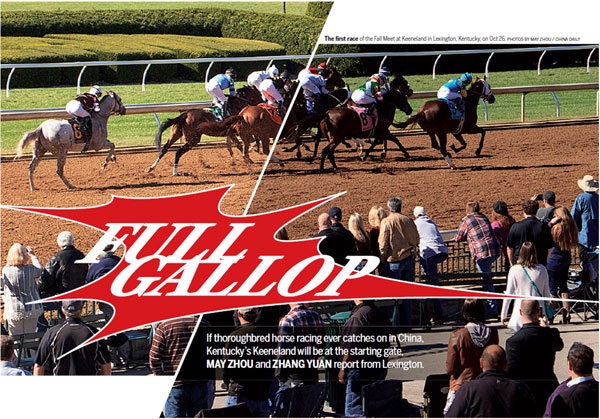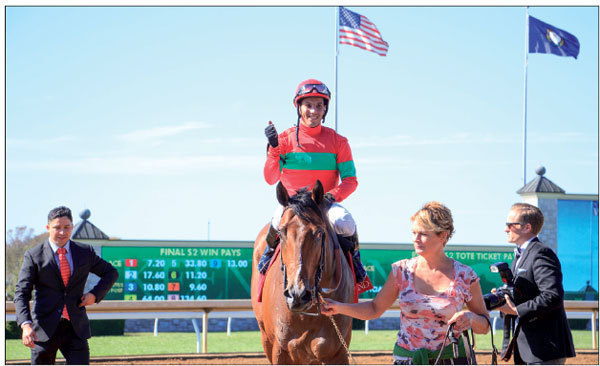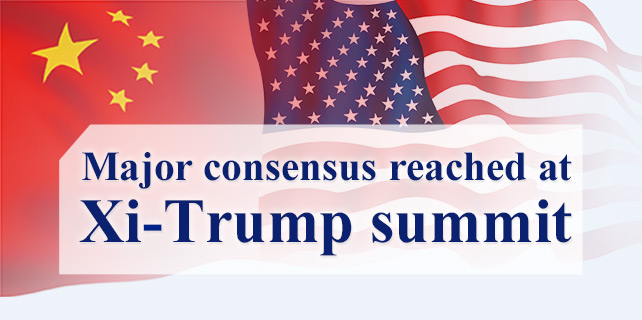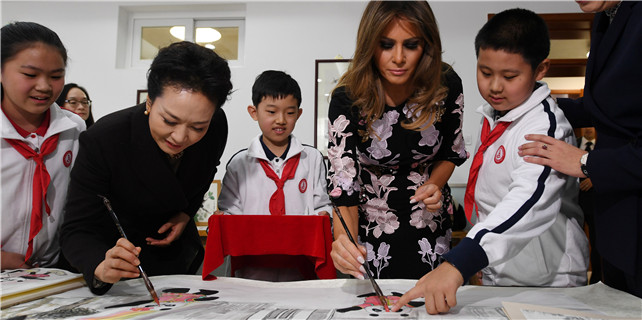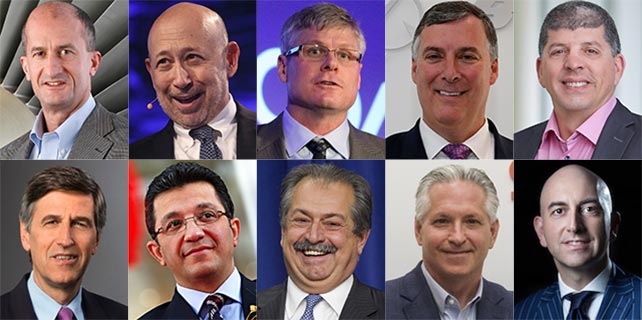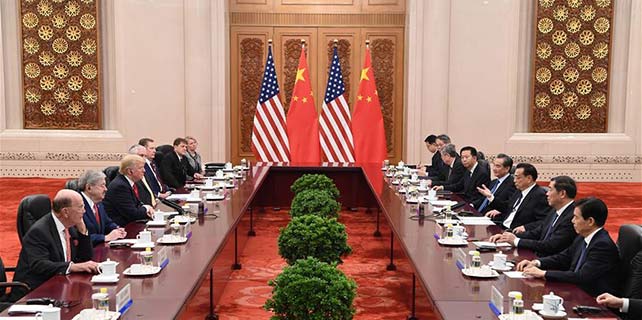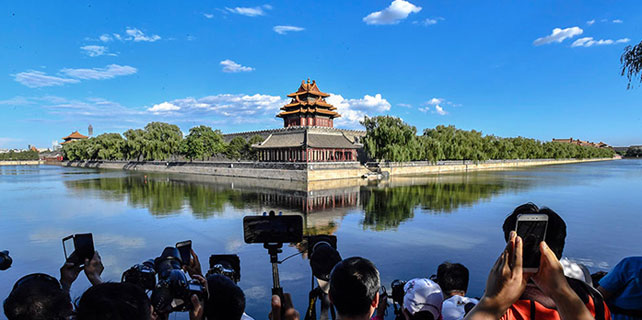Full gallop
|
The first race of the Fall Meet at Keeneland in Lexington, Kentucky, on Oct 26. photos by By May Zhou and Zhang Yuan |
If thoroughbred horse racing ever catches on in China, Kentucky's Keeneland will be at the starting gate, MAY ZHOU and ZHANG YUAN report from Lexington.
Across the street from the city-county government building in downtown Lexington, Kentucky, stands a cast bronze replica of the Chinese Han Dynasty sculpture Flying Horse surrounded by manicured rose bushes and shrubs.
The artwork is a gift presented to the people of Lexington by the city of Xi'an, an ancient capital city of China, in June 2000.
The friendly gesture from Xi'an to Lexington, a city known in modern times as "The Horse Capital of the World", seems to signal that the horse might provide a strong connection between China and central Kentucky.
All over Lexington, the image of a blue horse appears on public signs. According to Vice-Mayor Steve Kay, it's a relatively new logo for Lexington, combining the city's reputation as a horse mecca with the school colors of the University of Kentucky located right downtown.
"We have a long history of horse breeding and racing," said Kay. "The sales at Keeneland are major international sales of thoroughbreds."
Calling it the horse capital is no idle boast, he said. "People who know and value horses, anybody who is interested in the equine industry, will be here in spring and fall for sales and racing in Keeneland," said Kay.
Keeneland - a beautifully designed 1,000-acre race course and facility established in 1936 - runs races and hosts the largest thoroughbred auctions in the world. It was designated a National Historic Landmark in 1986 and listed on the National Register of Historic Places.
"Keeneland is known domestically as a horse racing facility. Internationally, we are known for our sales of thoroughbred horses," said Vince Gabbert, vice-president and COO of Keeneland. "We sell 9,000 horses on average every year. We just finished our September sale with gross sales of about $310 million."
Keeneland hosts three major auctions a year: yearlings in September; breeding stock in November; and horses of all ages in January. Buyers come from more than 50 countries the world over, according to Gabbert.
While horses can sell for as low as $1,000, the highest bid ever for a horse at Keeneland was $13.1 million.
|
Kahramani, ridden by jockey Vergara Rodrigo, won the first race on Oct 26 in Keeneland. |
Horses brokered at Keeneland have won races in the US, Europe and Asia, including 82 horses that won 88 Breeders' Cups; 19 Kentucky Derbys; 21 Preaknesses; 18 Belmonts and 11 Eclipse Awards for Horse of the Year.
Good Ba Ba (meaning "good father" in Chinese) is a Hong Kong-based thoroughbred that was purchased at Keeneland, according to sales associate Chip McGaughey.
Good Ba Ba is reputed to be the best racehorse in Hong Kong's long horse-racing history, which dates back to the 1800s and the days of British colonial rule, when the Hong Kong Jockey Club was established and horse-racing generated substantial revenue.
In the 2007-2008 season, Good Ba Ba had five consecutive wins in Hong Kong G1 and G2 races and was voted Hong Kong Horse of the Year.
In December 2008, Good Ba Ba set a new track record at Hong Kong's Shatian Racecourse. His overall 13 wins earned more than $3.2 million.
Besides selling the finest thoroughbreds in the world, Keeneland also holds a Spring Meet in April and Fall Meet in October each year.
The Spring Meet serves as a prep race for the Kentucky Derby at nearby Churchill Downs in Louisville on the first Saturday in May, the first leg of the Triple Crown.
"We very much try to create a festival atmosphere here," Gabbert said. "We have 15 days of racing in spring and 17 in fall. It's beautifully laid out like a park."
The facility also hosts more than 60 weddings a year and serves as a training facility.
Keeneland brings about $600 million a year into the region's economy.
"This is the best place to raise thoroughbred horses in the world," said Gabbert. "People who love this sport, many of whom can live anywhere in the world, choose to make Lexington their home because of the thoroughbred.
"We have some of the best equine bankers, lawyers and veterinarians residing within about 20 minutes of Keeneland," he added.
The combination of land and soil makes central Kentucky an ideal place for thoroughbreds, said Vice-Mayor Kay.
"It's gentle, rolling hills, not steep hills," Kay explained. "The limestone contributes to the quality of the grass and waterand gives a horse strong bones and a shiny coat. It's known as the best place to raise horses."
Even British Queen Elizabeth II could not resist the quality of thoroughbreds in Kentucky. "The queen does have a couple of horses here; they are always in the mix of horses," said Kay, who said a former US ambassador to the UK, also a horse lover, once hosted the queen here in Lexington.
The horse is such a big part of the Kentucky economy that the University of Kentucky, the state's leading institution of higher learning, established an equine program. Keeneland provides an endowed chair, according to Gabbert.
The program, which encompasses all things equine, was launched in 2005, when the university set out to radically change how it served Kentucky's signature industry. It is a multidisciplinary and cross-department collaboration program studying everything related to the horse business.
As China's wealth is fast accumulating, horses have been starting to catch the eye of some wealthy individuals as well as entrepreneurs. Horse meets started to appear in Wuhan more than a decade ago. Some cities such as Chengdu and Odors followed suit.
As Chinese interest in horses and horse racing has grown, they've been turning to Lexington. "We had Chinese come over before, but in the past three, four years, there has been a bigger influx," said McGaughey.
China forbids betting on horse racing, a sport that is still in its infancy on the mainland, but the rising interest in China can't be ignored.
"We have received several delegations coming here over the last three to four years," said Wang Changzheng, a professor at Kentucky State University and president of the Kentucky Chinese American Association.
"They come every year to try to buy horses. They bought some quarter horses for other games, but have not bought a thoroughbred so far. Racing in China is not quite developed yet," Wang said. "But once it does start, it will be big for thoroughbreds."
Even though Chinese interest in horses is budding, Keeneland has been quick to take action to build a relationship with China.
"We have a Chinese representative in Beijing to promote our thoroughbreds," said McGaughey. "We've also sent people to China to promote thoroughbreds several times already. One of our associates just came back from a meet held in Ordos."
For Keeneland, China is the largest untapped market and has the potential to become the largest market. In China, a city of 1 million is considered medium size. More than 10 cities boast populations over 10 million. Cities with 5 million are numerous.
"There is aspiration for the market just because of how large China is and how many large cities there are. There is great economic potential for thoroughbreds to take off in China," McCaughey said.
Some Chinese are already indirectly involved in thoroughbred racing and raising, said Gabbert.
"One of the main groups that has had the biggest impact on international thoroughbreds is the China Horse Club run by Teo Ah Khing, a Chinese-Malaysian national who has strong business ties to China. He has a luxury group attracting Chinese buyers who buy into his club. They race horses in China and around the world - Singapore, Australia, Europe and the US," Gabbert said.
Abel Tasman, a thoroughbred filly in Khing's group, won the 2017 Kentucky Oaks at Churchill Downs in late May, the world's most prized 3-year-old filly race with a total prize value of $1 million. Abel Tasman took home more than $500,000.
Khing is also involved in a project called Tianjin Equine Culture City, and his club runs an internationally endorsed thoroughbred racing carnival in China.
China Horse Club has also formed a partnership with Kentucky's horse farm WinStar to raise thoroughbreds.
A big China market for Lexington's thoroughbreds and other horses is quite possible because this industry attracts wealth, said Kay.
"In the last 40 to 50 years, a succession of people from other countries interested in this had come to invest," said Kay. "There are the Irish, because they have a long history of horse racing. The Japanese came when their economy was thriving in the 1990s to participate in the horse auction. People from Arabian countries have quite a presence here. They bought some of the most significant farmland in the county and surrounding counties."
And China may very well be the next big international player for a piece of Kentucky's horse business, and Keeneland wants to be ready at the starting gate when it happens.
"This is why we have a representative in China," Gabbert said, "to create a relationship so people understand what it means to be able to open that market."
"The other piece is about quality. We are in the caliber of quality that the Chinese government would want. We want to prove we have the right kind of product and build the relationship. When the market is open, we are ready," said Gabbert.
Contact the author at mayzhou@chinadailyusa.com







